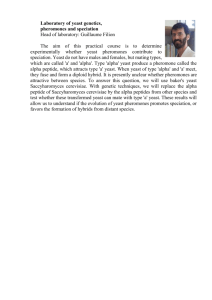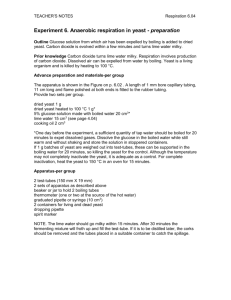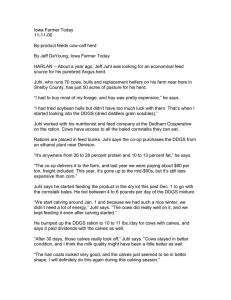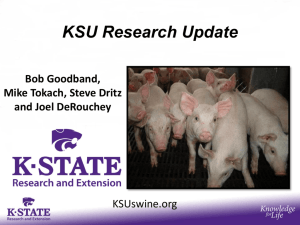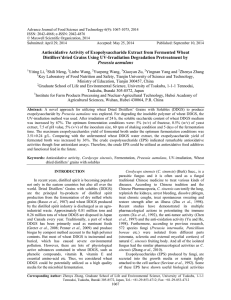Contribution of Fermentation Yeast to Final Amino Acid Profile in
advertisement
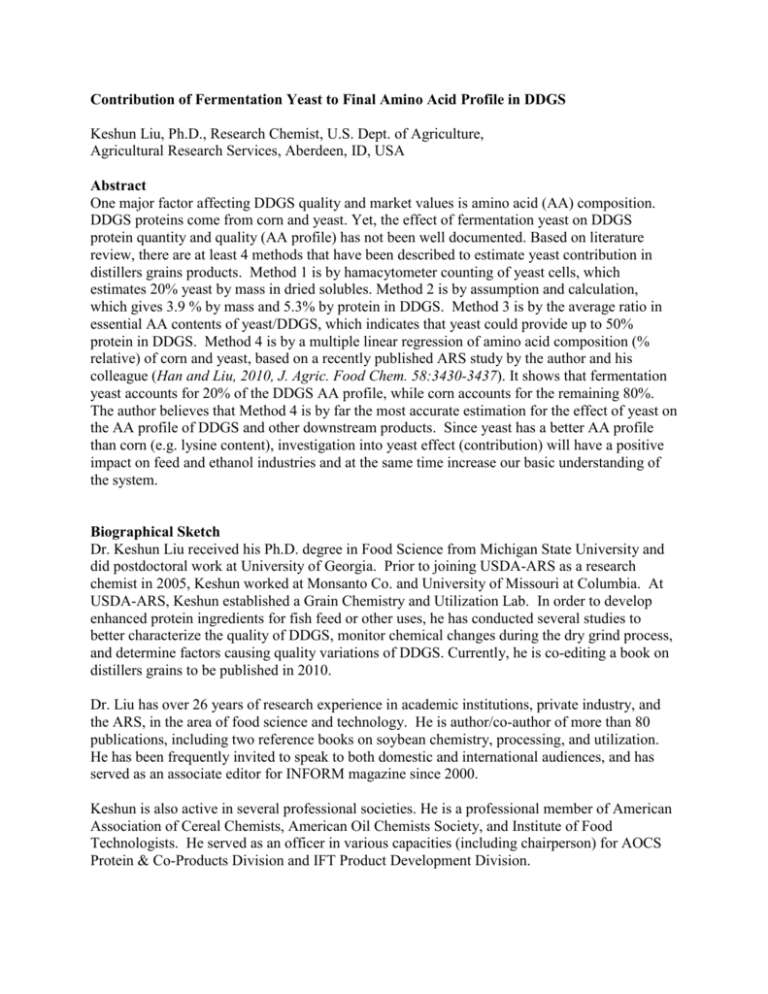
Contribution of Fermentation Yeast to Final Amino Acid Profile in DDGS Keshun Liu, Ph.D., Research Chemist, U.S. Dept. of Agriculture, Agricultural Research Services, Aberdeen, ID, USA Abstract One major factor affecting DDGS quality and market values is amino acid (AA) composition. DDGS proteins come from corn and yeast. Yet, the effect of fermentation yeast on DDGS protein quantity and quality (AA profile) has not been well documented. Based on literature review, there are at least 4 methods that have been described to estimate yeast contribution in distillers grains products. Method 1 is by hamacytometer counting of yeast cells, which estimates 20% yeast by mass in dried solubles. Method 2 is by assumption and calculation, which gives 3.9 % by mass and 5.3% by protein in DDGS. Method 3 is by the average ratio in essential AA contents of yeast/DDGS, which indicates that yeast could provide up to 50% protein in DDGS. Method 4 is by a multiple linear regression of amino acid composition (% relative) of corn and yeast, based on a recently published ARS study by the author and his colleague (Han and Liu, 2010, J. Agric. Food Chem. 58:3430-3437). It shows that fermentation yeast accounts for 20% of the DDGS AA profile, while corn accounts for the remaining 80%. The author believes that Method 4 is by far the most accurate estimation for the effect of yeast on the AA profile of DDGS and other downstream products. Since yeast has a better AA profile than corn (e.g. lysine content), investigation into yeast effect (contribution) will have a positive impact on feed and ethanol industries and at the same time increase our basic understanding of the system. Biographical Sketch Dr. Keshun Liu received his Ph.D. degree in Food Science from Michigan State University and did postdoctoral work at University of Georgia. Prior to joining USDA-ARS as a research chemist in 2005, Keshun worked at Monsanto Co. and University of Missouri at Columbia. At USDA-ARS, Keshun established a Grain Chemistry and Utilization Lab. In order to develop enhanced protein ingredients for fish feed or other uses, he has conducted several studies to better characterize the quality of DDGS, monitor chemical changes during the dry grind process, and determine factors causing quality variations of DDGS. Currently, he is co-editing a book on distillers grains to be published in 2010. Dr. Liu has over 26 years of research experience in academic institutions, private industry, and the ARS, in the area of food science and technology. He is author/co-author of more than 80 publications, including two reference books on soybean chemistry, processing, and utilization. He has been frequently invited to speak to both domestic and international audiences, and has served as an associate editor for INFORM magazine since 2000. Keshun is also active in several professional societies. He is a professional member of American Association of Cereal Chemists, American Oil Chemists Society, and Institute of Food Technologists. He served as an officer in various capacities (including chairperson) for AOCS Protein & Co-Products Division and IFT Product Development Division.




